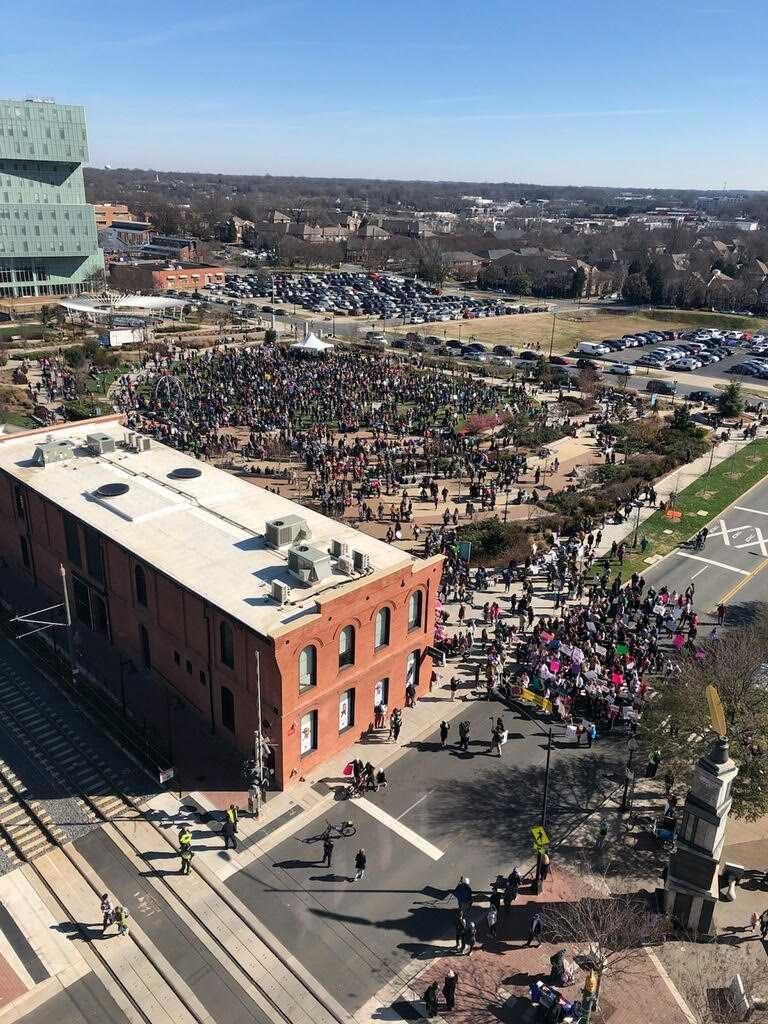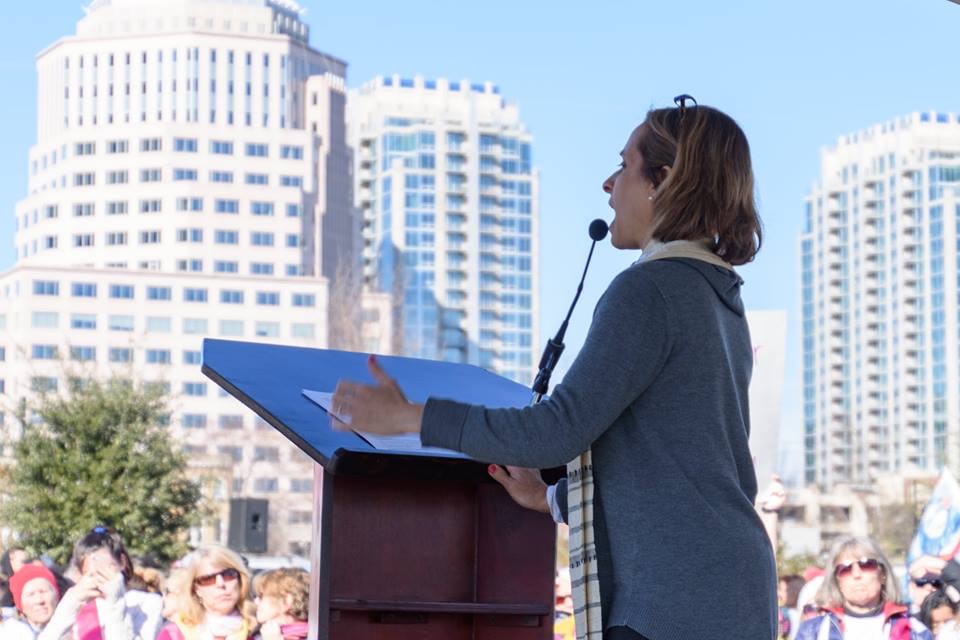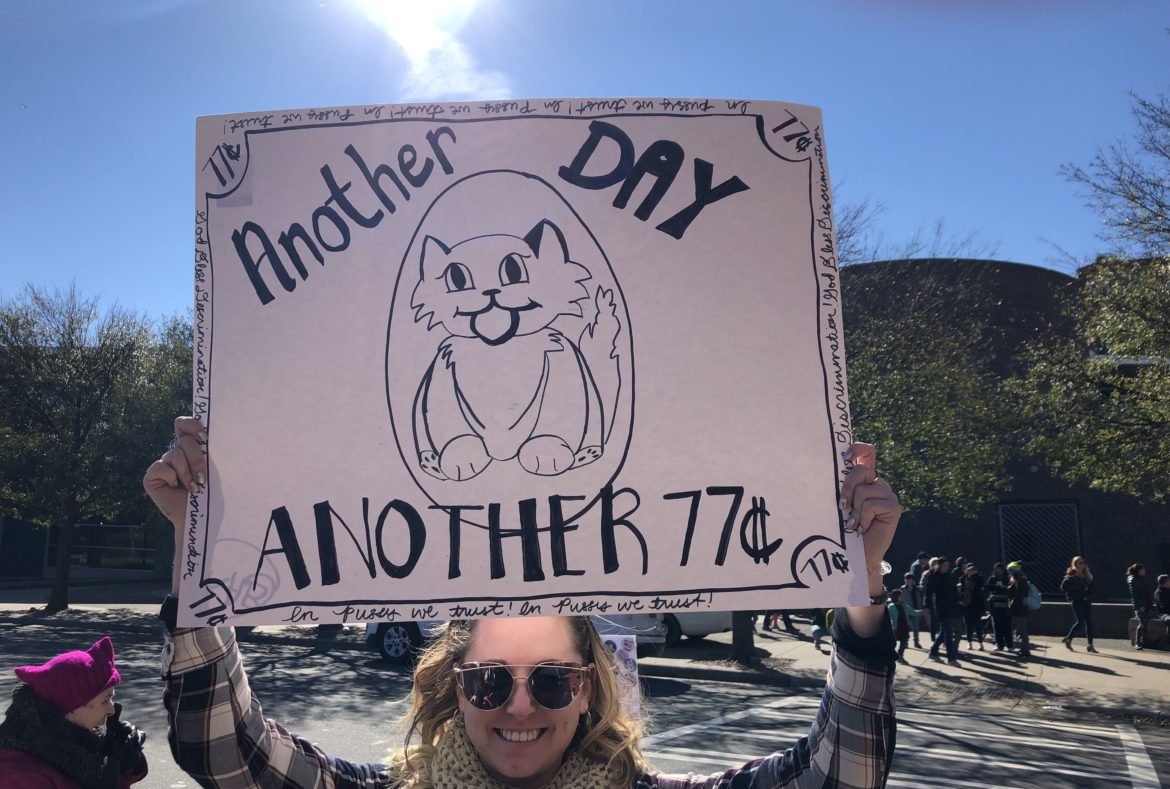Can you say, “I will support my sister”? Keynote at United Women March in Charlotte
Journeys to justice are not easy. They require risk. They require sacrifice from everyday people.
Journeys to justice are not easy. They don’t happen when we show up one time. They don’t happen when we show up once a year.
Rosa Parks, who started the Montgomery Bus Boycott, said “Ordinary people can do extraordinary things.” For 381 days, women and men walked to work.
Malala, as an 11 year old spoke out for the rights of Pakistani girls to receive an education. She said, “I raise up my voice – not so I can shout but so that those without a voice can be heard…we cannot succeed when half of us are held back.” At 15, she was shot in the head by a Taliban gunman because she was on a school bus
Supreme Court Justice Ruth Bader Ginsburg began arguing cases on gender equality in the 1970’s. At 85, as she recovers from cancer surgery she continues to fight for our rights.
Now the baton has been passed to us. It is our turn.

Journeys to justice are not easy. The Israelites in the book of Exodus learned that journeys to equality require courage. In the first recorded act of civil disobedience, the midwives Shifra and Puah refused to fulfill Pharaoh’s mandate of murder. The seas of injustice didn’t simply part, the Israelites had to march forward together.
The reality is that places of oppression like the Biblical Egypt continue to abound. Places of promise lie ahead. And we can reach them only by moving together through the sea of injustice.
What is the Biblical Egypt of oppression we yearn to leave?
Today’s Biblical Egypt of oppression is one of an unlivable minimum wage – I challenge any of you to live and support your families on North Carolina’s minimum wage of $7.25 an hour.
Today’s Biblical Egypt is one where people are cast out of their homes. As we lift up neighborhoods and invest in them, let us not cast out or cost out the neighbors who live in them. Let us only support gentrification that maintains diverse communities.
Today’s Biblical Egypt is exorbitantly expensive healthcare and gender disparities that leave women with poorer medical outcomes. Over 600,000 individuals file for bankruptcy annually due to medical bills.
Today’s Biblical Egypt is one of daily attacks on reproductive rights. Women require access to birth control for health reasons, economic reasons, emotional reasons, and professional reasons. Let us fight for the right of our sisters to decide when they want to have their children.
Today’s Biblical Egypt is systemic racism – placing ongoing obstacles in front of our African American sisters and brothers.
Today’s Biblical Egypt includes sexism – the sexism of pay inequity, the sexism of being called “sweetie” in the midst of meetings, the sexism of needing to select the right clothes to assert the authority that our male counterparts are freely given.
Today’s Biblical Egypt is one of hatred unleashed – homophobia, transphobia, Islamophobia, xenophobia, antisemitism – leaving people unsafe in schools, at concerts, in nightclubs, in houses of worship.
Today’s Biblical Egypt is one of mothers weeping over their children who have died by gun violence.
What is our Promised Land?
We have to clearly articulate our goals and continually move toward them.
We should aim for 50% of women in leadership. By 2050, we should aim for 50% women’s leadership — from our businesses to school boards to county commission to our state’s and nation’s legislatures. How many of you are considering running for office? We need you.
We should aim for freeing women from harassment.
2018 was the year of #metoo – of women having the courage to share their stories of being assaulted. One in five of us have been.
2019 can be the year of redemption – of freeing more women to work without abuse and to walk our streets in safety.
We should aim for women’s equality – in pay, in positions of authority, in healthcare outcomes.
The journey to justice is not easy.
There will be days when it will be hard. There will be days when we will not feel heard and we will walk away in tears or in frustration or with hurt feelings
We will not reach freedom’s shores if we are divided – so we cannot allow others to divide us.
With whom do we cross the sea of injustice to reach the Promised Land?
The journey to justice starts with new relationships. Many of us came with our own friends, but march today with someone new. This is an opportunity to find sisters of different races, religious, and backgrounds.
Start new conversations. Ask “What keeps you up at night? What prevents you from reaching the goals you want for your life?”
I march for many sisters who are not here at this moment. Those who have to work multiple jobs to support their families.
Can you say, “I will support my sister”?
I march for my friend Georgia Ferrell whose son was killed at the hands of police here in Charlotte. I will keep marching and working till there are no disparities in policing.
Can you say, “I will support my sister”?
I march for my friends Jihad and Rose – so they can feel free to wear their hijabs without facing Islamobophia.
Can you say, “I will support my sister”?
I march for my student Poulletth who came to this country as a 7 year old who worries about her immigration status and how she is going to pay for next semester as she studies to become a nurse. I march so her dreams can be as broad as my own children’s dreams.
Can you say, “I will support my sister”?
I march for the memory of my grandfather’s sister, Judith Schindler, who was shot and killed alongside her husband and five young children by the Nazis when she was 32 years old. I march to prevent antisemitism from marginalizing, dehumanizing, and demonizing the Jewish people.
Can you say, “I will support my sister”?
I will get to know my sisters of different races, religions and backgrounds and hear their struggles. I will mentor my sister. I will promote my sister. I will use my social capital to help my sister get into to college or get a job. I will work ensure my business or place of employment seeks women vendors. I will vote for my sister.
Can you say, “I will support all my sister”?

For whom do we cross the sea of injustice?
For our children. For all children.
For the migrant children still separated from their parents and the children living in detention centers
For the 15 million children living in poverty.
For the 26,000 young people who have been lost to gun violence since 1999.
For our sisters. For our mothers – for our mourning mothers, our ailing mothers, our aging mothers. For our daughters. For everyone’s daughters.
Journeys to justice aren’t easy. Crossing the sea is muddy and messy.
If you are a woman of faith, ask your clergy to work not only inside the sanctuary but also outside your building walls.. In this city of 1000 houses of worship, we need words spoken about helping the least of these not only in our sanctuaries, but also in City Hall and the County Commission and the State Legislature and in Washington.
Rosa protested not in prayer in her church pew but on a bus. She said, “I am tired.”
Let us say, “I am tired.”
I am tired of being underpaid and undervalued.
I am tired of being objectified.
I am tired of my sisters living in oppression.
Let us cross the sea of injustice hand in hand to get to our place of promise together.



2 Comments
Briana W Heniford January 27, 2019
Thank you so much for your meaningful and moving words. Please continue to inspire our movement toward a kinder and more just society. I believe they can motivate many to – including myself – push forward in that journey to justice.
Peggy January 27, 2019
Yea Rabbi Schindler! Powerful call to Justice and Promise!